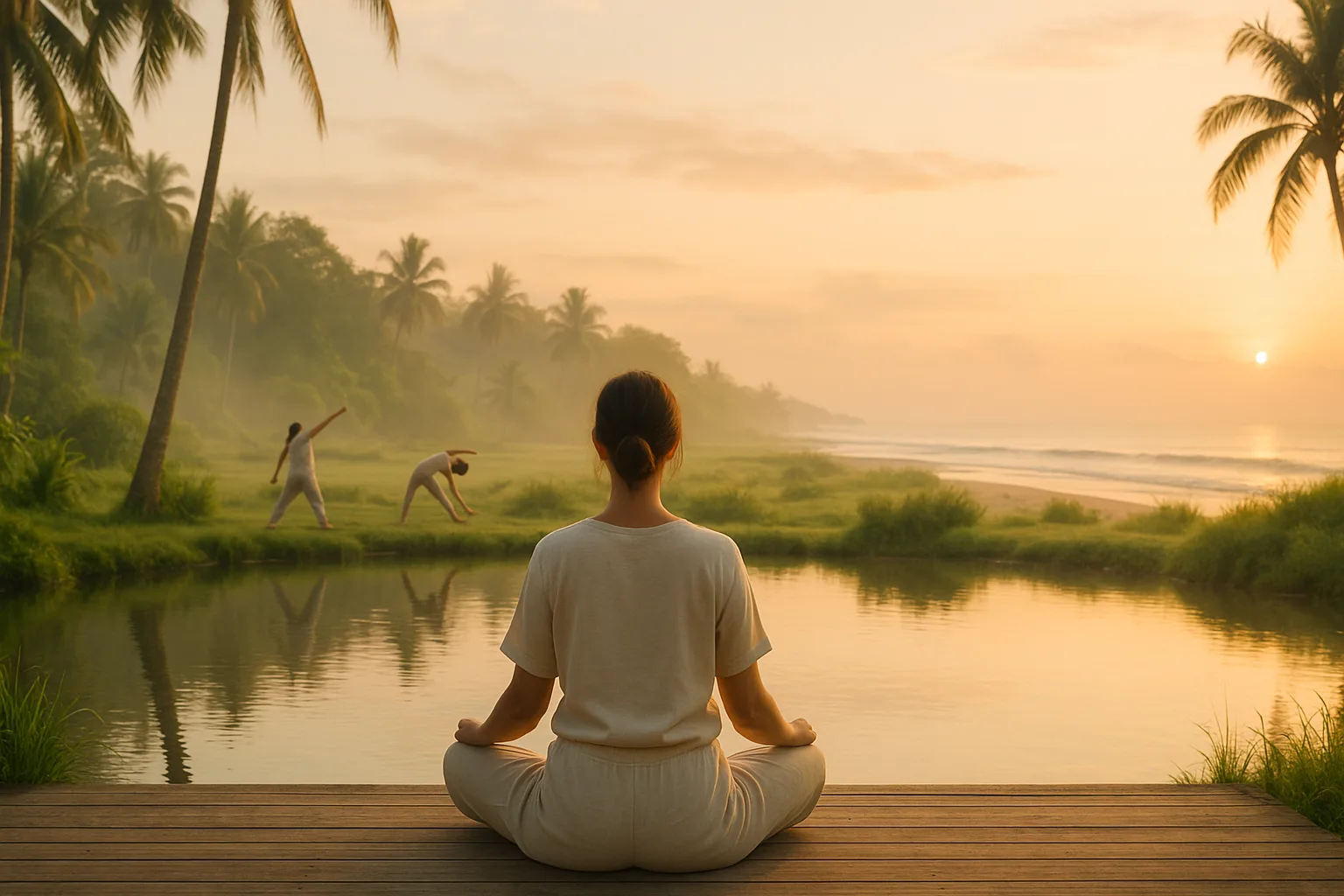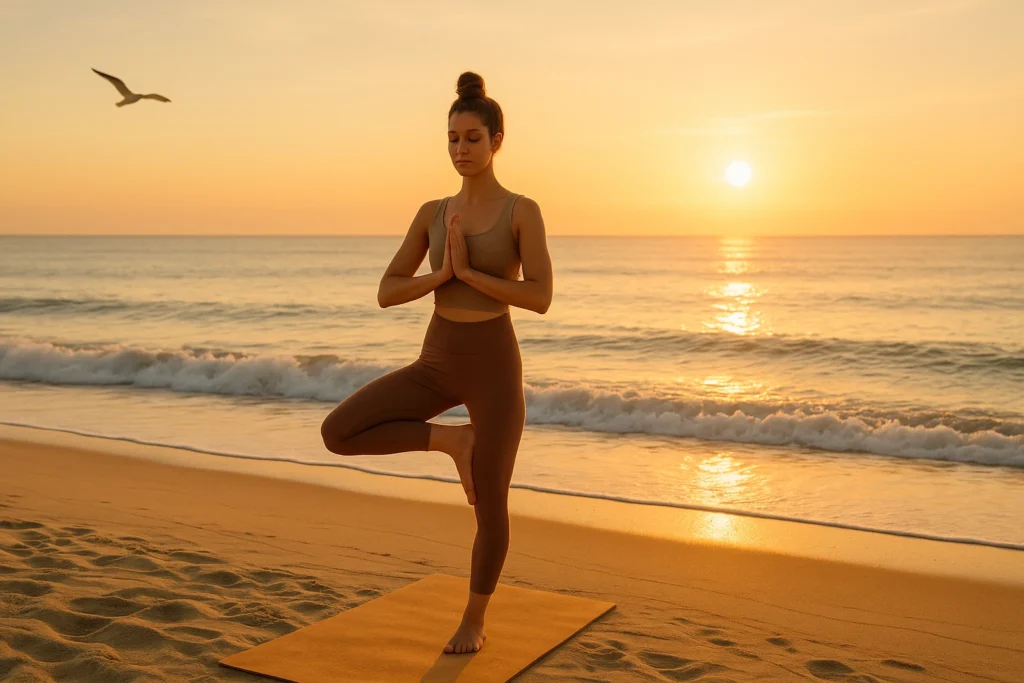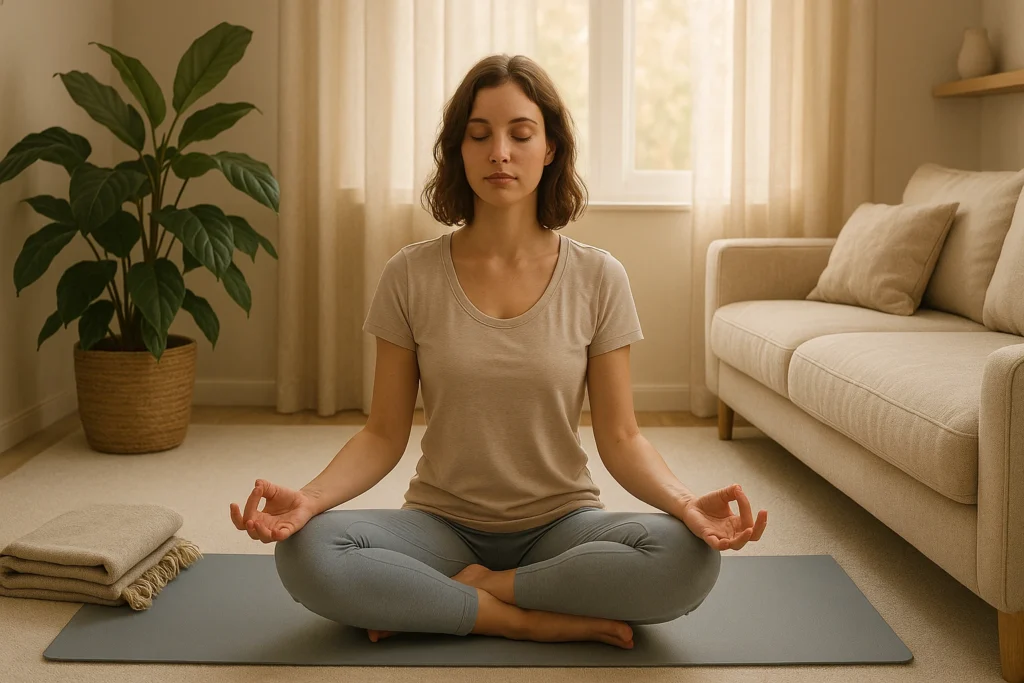
If life has felt heavy lately, you’re not alone. A yoga mental health retreat offers a steady reset—space to slow down, breathe, and rebuild resilience through mindful movement, rest, and reflection. For the complete overview of retreats and how to choose one, see our yoga retreat guide.
Track Your Mindfulness Now!Table of Contents
What Is a Yoga Mental Health Retreat?
This kind of retreat isn’t a typical getaway. It’s time set aside to care for your mind with yoga, mindfulness, and supportive activities. Instead of chasing advanced poses, the focus is calm, balance, and gentle recovery. Think: a quiet coastal setting where you can unplug, breathe, and learn a few practical ways to handle stress.
For example, you might:
- Unplug: Take a real break from screens and noise.
- Learn tools: Simple practices for stress and emotions.
- Turn inward: Build self-awareness without judgment.
- Process tough feelings: Do so in a supportive space.
Most programs combine gentle yoga, guided meditation, breathwork, and sometimes group support—so you’re caring for mind and body together. As one attendee put it, “By day three, my mind finally felt quiet.”
How Yoga Boosts Mental Well-Being
Yoga may help regulate cortisol levels, which can ease anxiety and lift mood. A 2018 study in Frontiers in Psychology reported meaningful anxiety reductions after several weeks of practice. It may activate the body’s “rest and digest” response via the vagus nerve, helping your system settle. With regular practice, some studies suggest levels of calming neurotransmitters like GABA may rise. You’ll also train attention, noticing triggers before they spiral. Many people notice better sleep, too, after slow, restorative sessions. Combined with mindfulness techniques for stress, yoga becomes even more powerful. For a concise evidence summary, see NCCIH’s Yoga for Health.
This post has affiliate links. We may earn a commission. Learn more.
Yoga for Mental Health: Building Emotional Resilience
Yoga gives you usable tools. One example is 4-7-8 breathing: inhale for 4, hold for 7, exhale for 8. It can help slow your breathing and heart rate so your nervous system has a chance to settle. The postures themselves are practice for staying present, which is the core of resilience. If you’re new to yoga for mental health, start small—five minutes of breathwork or a short restorative flow most days.
Sarah’s Story: Sarah, 35, arrived wired and exhausted. At a therapeutic yoga retreat, she learned simple breathwork and a short, gentle flow. “During one meditation my shoulders finally dropped,” she said. Now she does five minutes most mornings—and her days start easier.

Daily Life at a Yoga Mental Health Retreat
Most days start quietly—light through the windows, a few slow breaths, then grounded movement. Here’s one way a day might unfold:
| Time | Activity | Description | Benefits |
|---|---|---|---|
| 7:00 AM | Morning Gentle Yoga & Meditation | A slow Hatha or restorative yoga session followed by guided meditation or breathwork. | May reduce morning anxiety, improve focus, and set a peaceful tone. |
| 8:30 AM | Mindful Breakfast | A plant-based meal eaten mindfully, often in silence or with light conversation. | Supports mindful eating, may aid digestion, and fosters gratitude. |
| 10:00 AM | Therapeutic Workshop | Sessions on stress management, self-compassion, or CBT techniques led by professionals. | Provides coping tools, may reduce feelings of isolation, and offers new perspectives. |
| 12:00 PM | Nature Walk / Free Time | Guided forest bathing, journaling, or personal reflection. | May ease stress, invite reflection, and help you feel more connected to nature. 🌳 |
| 1:00 PM | Mindful Lunch | A wholesome meal shared with light conversation. | Strengthens community bonds, promotes mindful eating. |
| 2:30 PM | Restorative Yoga / Sound Healing | Gentle poses or sound baths with singing bowls for deep relaxation. | Helps the body unclench, settles the nervous system, and gives emotions room to move. |
| 4:00 PM | Optional One-on-One Session | Private sessions with a therapist or yoga instructor for personalized support. | Addresses individual needs, offers tailored guidance. |
| 6:00 PM | Mindful Dinner | A communal meal fostering connection. | Helps you wind down and end the day on a grateful note. |
| 7:30 PM | Evening Program | Guided relaxation, storytelling, or journaling prompts. | Encourages reflection, prepares for restful sleep. |
| 9:00 PM | Bedtime / Quiet Time | Winding down with tea or light reading. | Supports healthy sleep patterns, aids relaxation. |
Holistic Support at a Mental Wellness Retreat
A yoga wellness retreat embraces you as a whole person—mind, body, and spirit. Many incorporate principles from our Ayurvedic wellness guide to enhance healing. Here’s how:
Mindful Eating and Nutrition
Retreats often serve organic, plant-based meals and encourage slow, mindful eating. That rhythm supports a healthier relationship with food—and your gut, which is closely tied to mood. 🍎
Nature Immersion
Many retreats, like those in mountain settings, include forest bathing or ocean walks. A 2019 study in Frontiers in Psychology found that spending about 20–30 minutes in nature measurably lowered cortisol (“a nature pill”). Read the study. 🌲
Creative Expression
Art therapy, journaling, or music sessions let you express emotions non-verbally, tapping into creativity and aiding emotional processing. 🎨
Sound Healing
During a sound bath, the last note seems to hang in the chest—you may notice your jaw unclench and your breath deepen.
Community Connection
Community grows in small moments—names you learned at breakfast feel familiar by dinner, and the room softens.
Who Benefits from a Yoga Wellness Retreat?
These retreats suit a wide range of people seeking emotional well-being. For instance:
- Stressed or burned-out: If work has you wired and tired, a retreat gives you a pause button—and a simple plan for easing stress.
- Those with mild anxiety or depression: Can ease symptoms, though it’s not a cure. Always consult a doctor for personalized guidance.
- Seeking emotional healing: A quiet setting—with skilled support—can help you meet grief or old hurt at a kinder pace.
- Those needing a digital detox: A structured break from technology to reconnect with yourself. 📵
- Caregivers or Frontline Workers: Replenishes reserves for those in demanding roles. For example, Lisa, a nurse, found a retreat helped her rediscover joy after months of compassion fatigue.
Reflective Prompt: Who are you hoping to become through a retreat? Jot down one intention to guide your journey.
Choosing the Right Retreat
Finding the right retreat takes a bit of research. Consider:
- Location: Prefer mountains or a beach? A serene setting enhances healing. 🏞️
- Duration and cost: Try a weekend if you’re testing the waters; choose a week if you need a full reset—pick what fits your life and budget.
- Instructor qualifications: Choose certified teachers with trauma-sensitive or mental-health training—ask them about it.
- Program Focus: Some specialize in anxiety or burnout recovery—look for stress relief retreats that emphasize restorative yoga and breathwork. Choose one matching your needs.
- Reviews: Positive feedback on staff support and atmosphere is key.
What to Expect at a Yoga Mental Health Retreat
If you join one of the many stress relief retreats, expect skills you’ll actually use on a Tuesday afternoon—many echo the ideas in our yoga for stress relief guide. You’ll experience:
- A Safe Space: Retreats often feel like sanctuaries, with compassionate staff available.
- Emotional release: Strong feelings may surface during meditation or yoga. This can be a healthy, supported process. If they do, take breaks and reach out for support.
- New tools: Simple practices—like breathwork—you can use on ordinary days.
- Community: Gentle connection with others can ease the feeling of going it alone.
Mark’s story: Mark, 48, was skeptical but tried a retreat. During a sound healing session he noticed tears release years of tension. Now he meditates most days and finds more ease in small moments.
Preparing for Your Retreat
To maximize your experience:
- Pack light: Bring comfortable yoga clothes and layers. 🧳
- Journal: Reflect on your experiences daily.
- Communicate needs: Tell the team about injuries, medication timing, or food needs so they can look after you.
- Manage Expectations: Be open to vulnerability; it’s a journey, not a quick fix.
- Try a Breathing Technique: Practice 4-7-8 breathing now to prepare.
Track Your Mindfulness Journey
Monitor your mood and mindfulness practices with this interactive quiz. Click one option per question to see how your retreat-inspired habits evolve.
Step 1 of 4
How’s your mood today?
Frequently Asked Questions
Conclusion
A yoga-focused mental wellness retreat gives you time away from daily stress to actually look after your mind. By blending yoga, mindfulness, and therapeutic practices, these retreats provide a sanctuary for healing and self-discovery. Whether you’re managing anxiety, seeking emotional balance, or craving a deeper connection with yourself, a mindfulness retreat equips you with tools to cultivate lasting resilience. If it feels right, try it—you may notice the difference back home.


